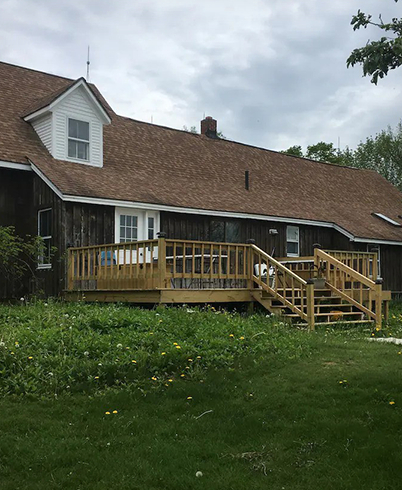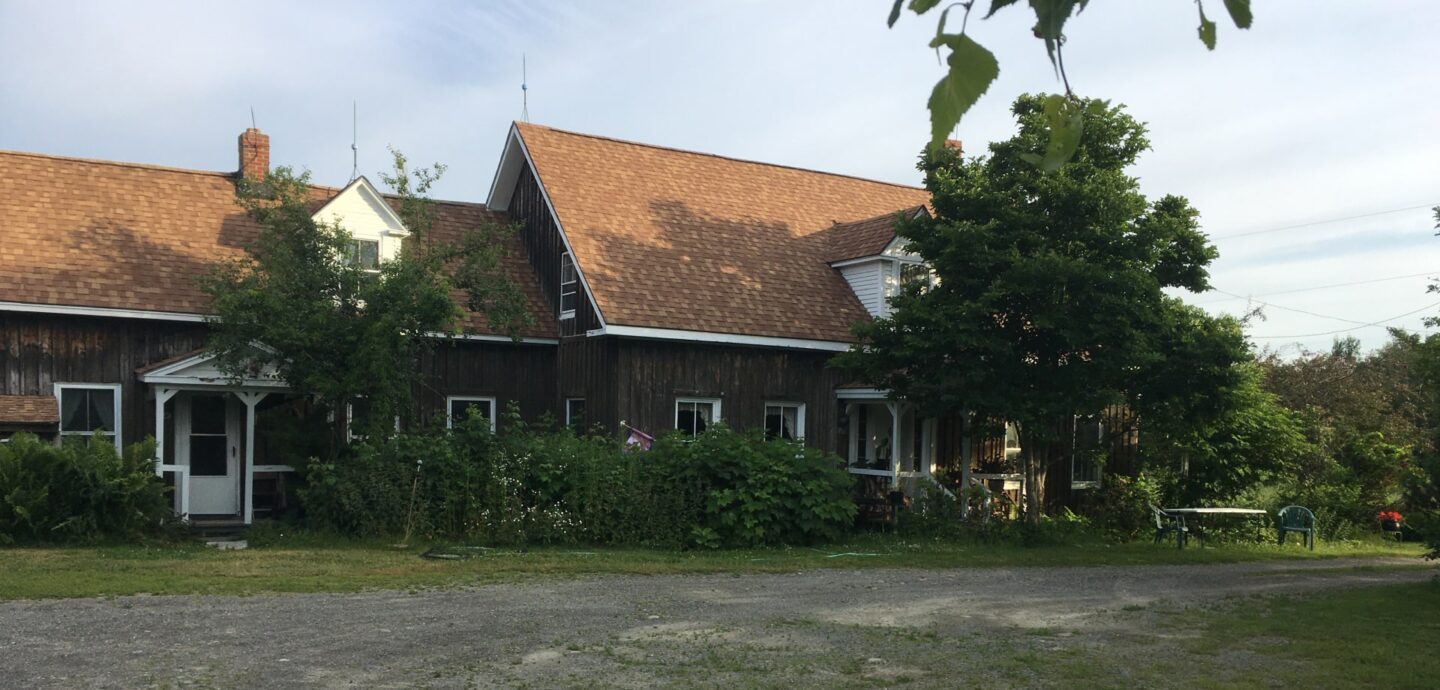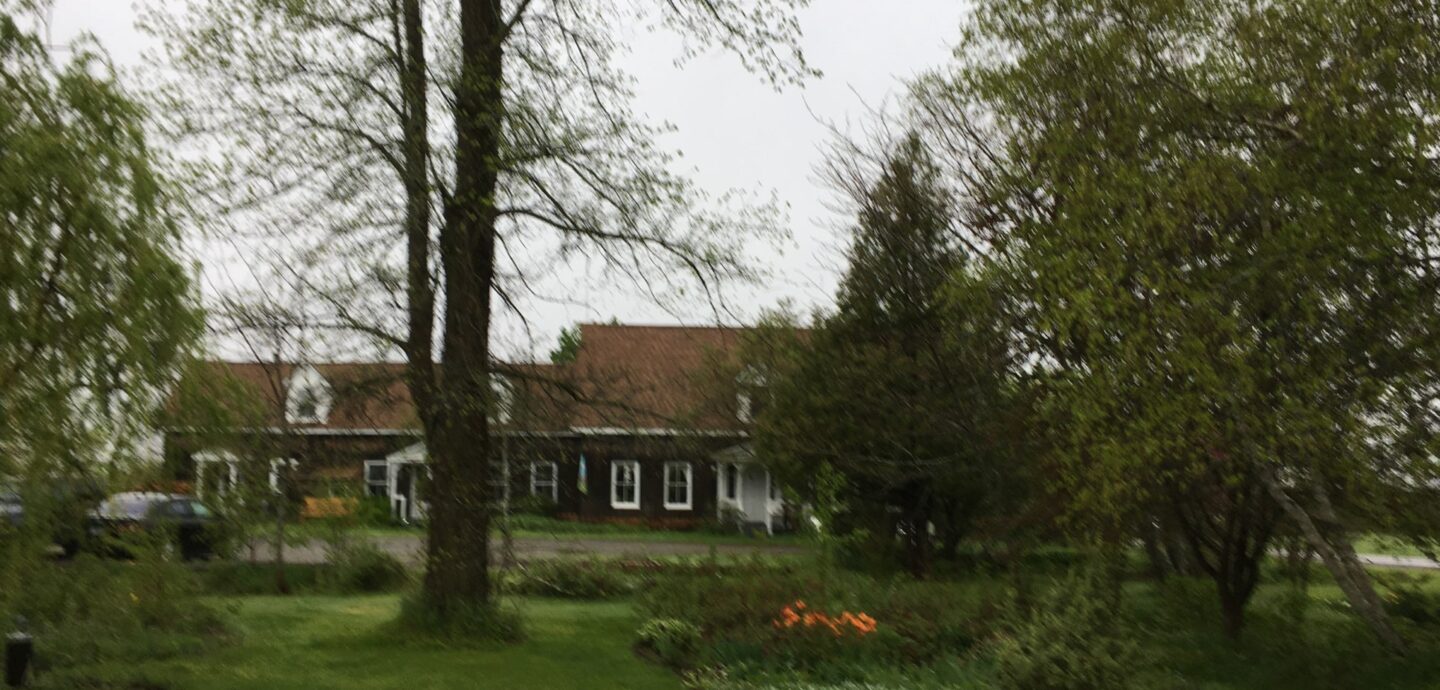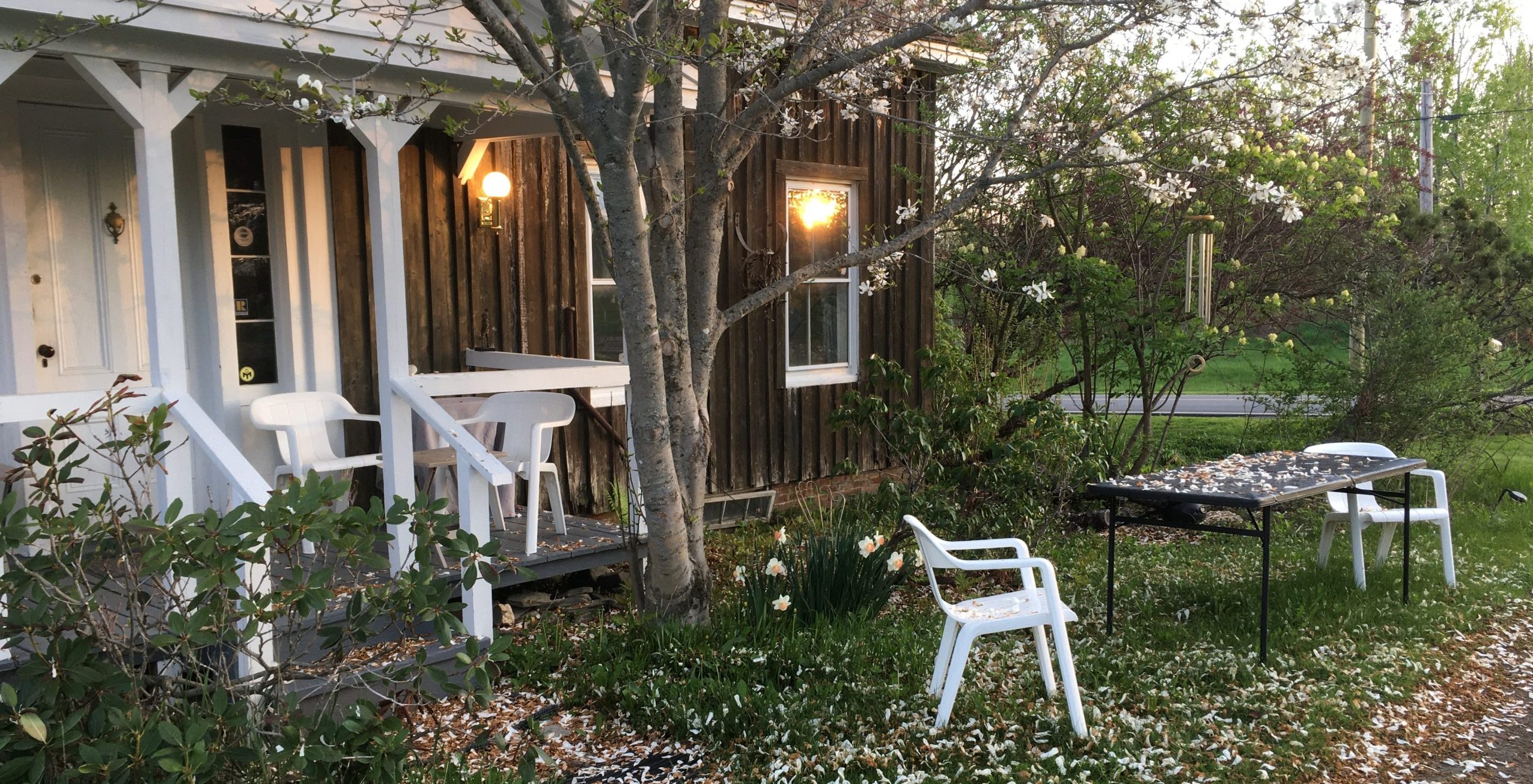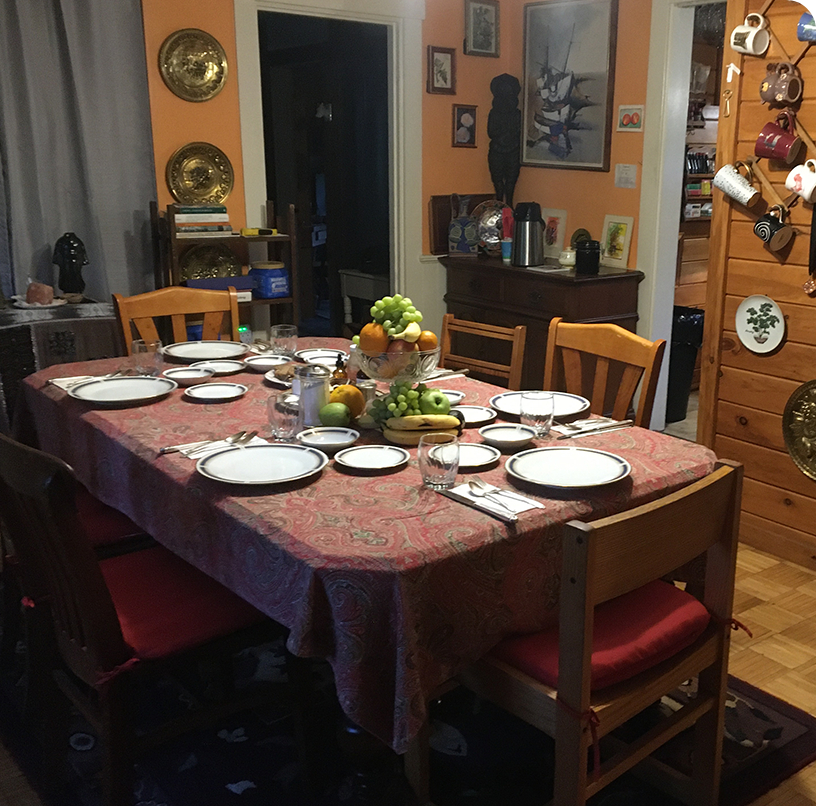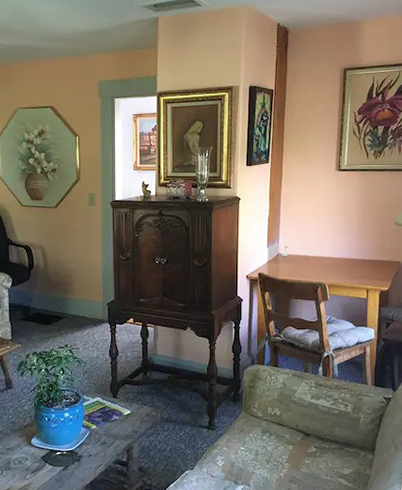WWOOF Around The World
Stay and Learn on organic Farms
-By Kevin P. Tremblay
Two WWOOFers stayed at Labyrinthia Guest House for a week this summer to help with my permaculturally designed foodscape. Working alongside Caitlin and Caleb from Glasglow was motivating. WWOOF stands for World Wide Opportunities on Organic Farms. Beginning in the early 1970s people have been volunteering on organic farms to learn the ways.
The WWOOFers here picked and dehydrated apples showing me how, and made an apple pie too. I had a challenge grinding roasted dandelion roots. They become rock-hard nuggets when dried and cannot be ground in a blender without breaking it. Caitlan used a wooden mortar and pestle to grind them. Never thought of it. Dandelion root does taste like coffee when brewed.
We gathered and sundried stinging nettles used in Labyrinthia teas. We transplanted a large crabapple seedling over 6 feet, and they weeded the asparagus bed. Caleb even pounded cedar posts in from a ladder with a sledgehammer. They were a big help and taught me a few things.
We went on Field trips and Visited
Green Garden Farm
in Saint Albans during their Garlic Harvest Open House. Jose gave Caitlin and Caleb a tour of the peony beds and garlic field. We also visited the Ripley Town Museum Open House which contains antique farming implements and kitchen wares used in storing food.
We stopped at Pratt Family Greenhouse in Newport, where Caleb purchased a bar of homemade soap for a gift for someone back home. Caitlin is beginning her second year in college studying graphic arts when they return, and Caleb goes back to work in Glasglow. They are considering a croft in the Highlands once she completes her studies. A croft is a small, leased farm with a common pasture typical in the Highlands.
For several hours of work a day, a WWOOFer gets room and board. The food is often farm-fresh and grown there. The host farmers agree to teach what they know, and feed and house the WWOOFer in exchange for labor. There is a wide choice of farms to stay at and learn to grow food without poisons in sustainable regenerative agriculture operations.
Farms may even be specialized such as Bio-Dynamic Farms or places that raise livestock and chickens in a rotational grazing method. Goats follow cattle, and next are the pigs with chickens coming in behind. Check for the best sequence of livestock rotation.
All Over the World WWOOFers Live On Farms
Some WWOOFers travel with tagalong trailers, others bring tents and sleeping bags. Often the WWOOFers are put up in the farmer’s home. There could be barn accommodations dorm style with outside showers. Each farm is different. Investigate and interview hosts. For WWOOFing in the States, go to, https://wwoofusa.org/en/, and for worldwide opportunities go here, https://wwoof.net/.
The details of a farm stay are negotiated ahead of time. Both sides should know what to expect. Everyone is vetted and background checks are done. You still will need to interview a host farmer/family to ensure a good fit. The individuals work out the time of year for their stay and how long. First, what kind of farming is done? Other considerations such as diet should be discussed beforehand.
- For 50 years people have been learning directly from farmers.
- It is a great way to vacation too, with little daily expense besides travel.
- All over the world, in Canada, and the United States you can WWOOF.
- Get on a bus or fly nonstop to practically any destination in the world for a working farm vacation.
Note: When I moved from Boston and stayed in a cabin in the woods waiting to move in here, I experienced sensory deprivation. From the streets of Boston to the birds chirping in the woods can cause a distortion of the senses. Take that into consideration. The complete change of location, customs, language, and lifestyle can take some time to get used to. Also, consider your comfort zone. Will you be sleeping in a dorm with 20 others? Are there laundry facilities?
I Recently Me Someone Who Has Been WW00Fing For Years.
She spends winters in Florida picking citrus or on other kinds of farms. Some winters are in Arizona, Texas, or California. As the spring moves up the seaboard she does too. Spending summer on a Vermont farm or in Maine picking organic veggies and pulling weeds. She selects farm locations that are near things of interest and on her bucket list to see. Hot showers are a must for her. So, check about this. There is every kind of farm possible to select from.
Farms can be remote, like in the Australian Outback, or wilds of Alaska. There are 37 farms offering WWOOFing in Maine. I’m one. The qualifications are the operation is organic and farm (in the broadest terms), or grow plants for use, or a homestead farm. Host farms may grow flowers for the market while other ones herbs for tinctures or raise goats for homemade soap sold online. There may be visits to the farmer’s markets and the farm may have a roadside stand you may help with. There are alpaca and horse farms too.
If WWOOFing Is In Your Future, Plan Months Ahead.
The posher places get booked early for the coming season.
- Do you know the language of the place you might want to visit?
- Will there be Wi-Fi available, and is there local transportation?
- What hours of work will be expected and are there days off?
- Again, what is the diet going to be like, and will there be enough; can you raid the refrigerator?
There are larger operations that may have 30 WWOOFers and other farm workers too, so know what you are getting into. Some family farms operate based on certain religious principles or have group prayer during the workday. The host country and farm itself operate in the environment and culture it is in.
WWOOFing is a great experience for young people. It can answer the question of whether they want a life on the ground as a weed grubber, or to mind cattle 24/7 with little time off. Also, this might be the opportunity needed to clear the cobwebs in the mind. A getaway to labor on the earth for a time might help clear up any wrong thinking and recharge the soul.
WWOOFing can become a nomadic lifestyle too when following ripening fruit around the world, from a banana plantation in Africa to citrus in the sunbelt, and potatoes in the county. You get to choose if a host is willing to take you on. The individual pays all their own expenses for travel and food until they get to the host farm. In addition, money will be needed to get back home, and all in between the host farm and your front door.
A Passport is required when going overseas, and a Visa is often too. WWOOFing is considered a volunteer learning opportunity and host countries may be more lenient about getting in. Have you ever thought about living in a hut beside a rice patty in Japan? In New Zeeland, there are hundreds of hosts. From flower farms to growing and harvesting saffron, and vineyards. Recheck your bucket list. It may need WWOOFing added.
Related Blog
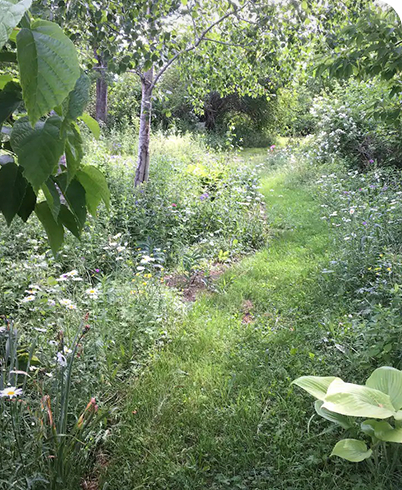
Vestibulum ante ipsum
